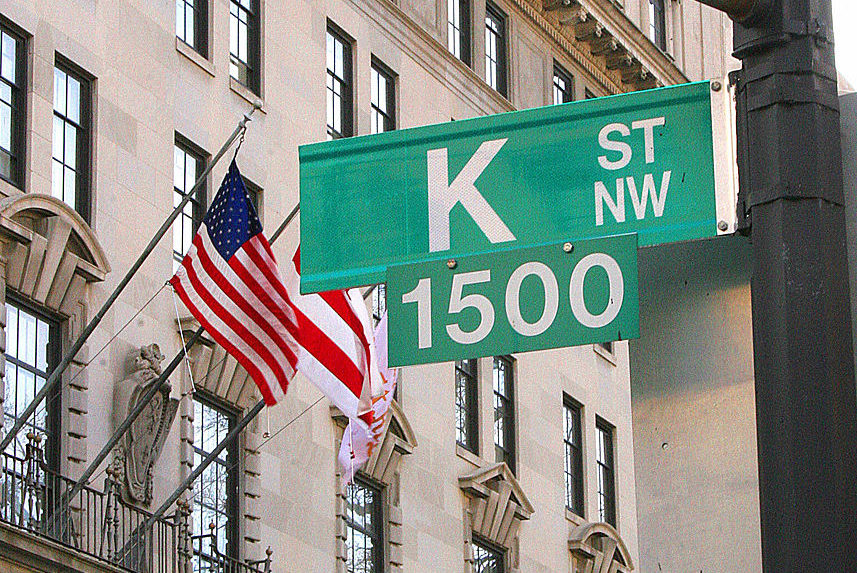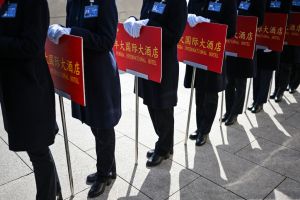You couldn’t miss him as you strolled down K Street. He wore a fedora and boxy suits, was not afraid to imbibe as he worked, and paced the capital’s most infamous stretch chain-smoking cigarettes. He arrived in Washington in the Nineties as a traveling salesman and would have kept right on traveling were it not for that checkout girl. For three decades, he put the road behind him and went to work erasing any trace of the street from the brogues, Oxfords and, in the final decade of his life, the slip-on monks and bit loafers ubiquitous among the graceless lobbyists of the twenty-first century. K Street may have become too busy to tie shoelaces, but its denizens were never too busy for a happy-hour stop with the self-proclaimed “Godfather of Shine.”
“White Pony” Tony Lugthart dressed like a two-bit gangster during the daylight hours before donning a country wardrobe at a Virginia karaoke bar in the moonlight, where he offered his services to the souvenir-shop cowboy boots of defense contractors and Pentagon officials eager to advertise their downhome roots, even as their well-paid presence subdivided and McMansioned the bucolic farmland of northern Virginia. He was at home in both worlds, though the latter came more naturally owing to a childhood spent shining the boots of his stepfather, a rodeo man and soldier.
The Jimmy Cagney get-up he adopted while manning his two-chair stand at McCormick & Schmick’s always seemed like a persona, a bygone caricature of what a layman thinks political dirty operators, movers, shakers and influence peddlers are supposed to look like. Anytime you glanced at his stand through the plateglass window, you could see the high-powered Washington microcelebrity meritocrats laughing at his dirty jokes and absurd stories. But it was always patronizing laughter, the same one parents use when their toddler tells a knock-knock joke.
“He made a family out of his customers and those who worked near his shoeshine stands. Some of his customers stayed with him for decades and became close friends. He was proud of all his customers and the friends he made, often connecting them with one another. He always found a way to bring them up in conversation,” his stepson Gerald Vasquez recalled after Tony died of liver cancer on June 11 at sixty-two. White Pony Tony’s local celebrity earned him write-ups in the Washington City Paper, Amtrak magazine, and even a full profile in a local trade sheet called the Washington Post. It was only fitting that he would be eulogized in those same pages as “equal parts boot-black and Benihana chef” in a June write-up from the Post’s John Kelly, a regular customer. Kelly was generous enough to link to the GoFundMe profile Vasquez established to meet the $20,000 funeral costs.
The GoFundMe page namedrops just as much as Lugthart did when you sat down for a shine. It mentions the Omni Shoreham — the soi-disant “elegant urban retreat” that “boasts a resort atmosphere and a personal taste of politics, culture, art and music” — the Mayflower Hotel — “Bold originality. Timeless elegance. Exactly like nothing else” — George Clooney, Jimmy Hoffa Jr. and Tom DeLay. Lugthart never seemed to ask his famous friends for a handout beyond the tips they threw on top of the $10 he charged for his bespoke shining services — but in death, the name-dropping sounds an awful lot like a cry for help. Three weeks after the city’s corridor of power was alerted to Lugthart’s passing in its favorite rag and the Google Alerts on DeLay and Hoffa’s email accounts went off, the fundraiser has managed to raise… less than $5,000.
For all the pomp of the GoFundMe, no names stand out on the public list of donors — though, who knows, maybe DeLay is the anonymous donor behind the $5 donation dropped in the bucket just before the Fourth of July weekend. Vasquez did not respond to an email about whether the family had received private help from any of his father’s well-heeled clientele. The only person who bothered to comment on the page is a man named Barry Brown, who evidently worked with Tony at McCormick’s twenty years ago.
Three decades sweating and dancing at the feet of the town’s most powerful and highly compensated people was not enough to stir the hearts of the Washington machine. Because at the end of the day, a bootblack is a bootblack in the eyes of the economists and lobbyists and white-shoe lawyers.
K Street, more than any other entity short of Congress, bears the most responsibility for America’s transition into a service economy. Its denizens have loudly insisted for decades that the GDP and free trade and outsourcing could free up disposable men like Tony Lugthart to find new employment slinging their drinks, driving their Ubers or shining their shoes. They failed to mention that even the most bespoke of services renders these workers reliant on the beneficence of our modern meritocrats, who traditionally hide their contempt for the proles beneath a veneer of patronizing polish. They have grown impatient with maintaining the facade.
Tony may have seen his clientele as family, but Covid exposed that it was a case of unrequited love. The K Street gang, which always seemed so chummy with their bartenders, servers and shoeshine men, had no problem robbing them of their livelihoods once their peers in the expert class announced that a sacrifice must be made to the gods of public health. Nearly 30,000 restaurant workers lost their jobs in Washington; the lucky survivors were muzzled behind masks as they waited on fresh-faced Zoom-workers, well-rested from two years of binge-watching prestige television. Tony’s stand was one of the casualties. He was buried in Alexandria, Virginia, on July 9.
This article was originally published in The Spectator’s August 2022 World edition.


















